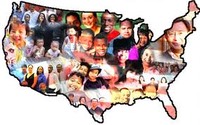
The European and the Native worlds first met in 1492 when Italian explorer, Christopher Columbus, sailed from Spain landing in the Americas. European explorers were followed by conquerors, like Cortez, who plundered the gold of the Aztecs. Following the conquest, the European powers carved up Native lands, declaring them colonies of the European monarchs. The British settled on on the east coast, establishing the Crown's 13 colonies. These colonies, which grew before the American Revolution, were distinct, differing in land, climate, and culture.
Lessons:
Lesson 1 -Two Worlds Meet - Europeans in the Native World
Lesson 2 -The New England Colonies
Lesson 3 - The Middle Colonies
Lesson 4 - The Southern Colonies
Lesson Materials
- Map of European Claims in Native World
- Map of European Colonies in North and South America in 1763
- The Columbian Exchange - Brainpop
- Jamestown Part 1 - Brainpop
- Jamestown Part 2 - Brainpop
- Thirteen Colonies slideshow - Dad
- Regions of the 13 Colonies BrainPOP
- Building the 13 Colonies BrainPOP
- Slavery BrainPOP
- The French and Indian War BrainPOP
- 13 Colonies map activities - Seterra
- Printable 13 Colonies map and Scavenger Hunt
- 13 Colonies Regional Map
- 13 Colonies Regioinal Map 2
- Colonial Products Map - TCI
- Comparing 13 Colonies Organizer - TCI
- English Settlers Visual - TCI
- Jamestown - TCI
- Jamestown 2 - TCI
- Middle Passage - TCI
- Plymouth - TCI
- Roanoke - TCI
- Slaves - TCI
- Slaveship 1-TCI
- Slaveship 2 - TCI
- Southern New England - TCI
